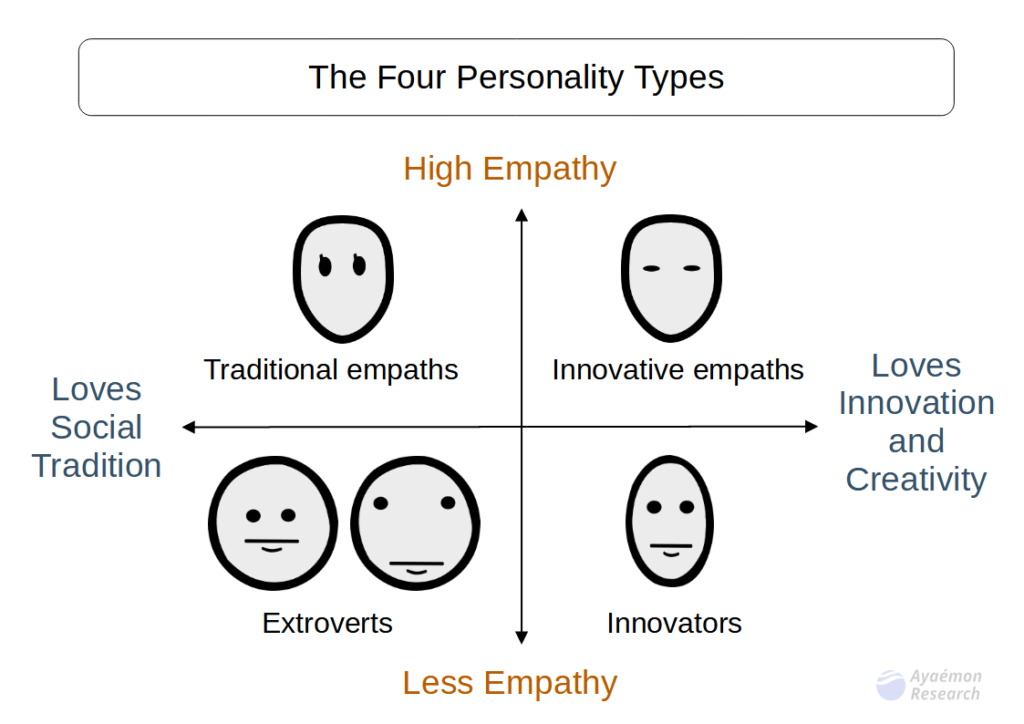Recently, I have talked about mental logic with my personality classification. I like it because it shows us our mental logic more clearly. Today, I will explain people’s personalities more deeply.
How to distinguish people’s personalities
Sometimes, we are confused about values. An inferiority complex often prevents us from distinguishing our values from other’s values.
That suffers us because it prevents us from living as we are. For example, we might try to accomplish something that doesn’t suit us. We might look down on someone who cannot do it well, even though we don’t like comparing and don’t want to do it.
In such a situation, distinguishing between our personalities will help us because it will calm our confusion about values.

However, we sometimes find it hard to do it because some people lie about their personalities. They pretend to have another personality. That often confuses us.
Today, I will introduce a way of thinking to distinguish personality, even if the person is lying.
The four types of personalities
To explain it, I will use the four types of personalities that I often use, as follows:

I classify people’s personalities into four types:
- Extroverts: People who cannot feel others’ emotions. That nature makes them look down on people who cannot do something well like them. They like competition and ranking in primitive areas, such as bravery, strength of muscle, social force, status, heavy eating, or heavy drinking. Many people tend to pretend to be this type in society because this is the majority.
- Traditional empaths: People who feel others’ emotions. That nature makes them help weak people even without material rewards because they can get mental rewards from that. They are the easiest to believe and adapt to another type due to empathy. Women tend to pretend to be this type.
- Innovators: People who cannot feel others’ emotions. They prefer rationality to primitive values. (Not in use this time.)
- Innovative empaths: People who feel others’ emotions. They prefer rationality to primitive values. They are easily confused with others’ values due to empathy, but they can correct it with their rationality. (Not in use this time.)

Two examples of how to distinguish lies about personality
Perhaps the most reliable way is to distinguish them by their faces. I explained it in an earlier post (this article). If you are interested in it, please refer to it.
This time, I will introduce other ways. I will show you below two typical examples of a person pretending to be another type.
- Extrovert-oriented traditional empaths
- Traditional empath-oriented extroverts

(1) Extrovert-oriented traditional empaths
First, there are extrovert-oriented traditional empaths. Although they are traditional empaths, they pretend to be extroverts due to their inferiority complexes. This is one of the most typical examples we can find in our everyday lives because this type of person tends to have a high social status.
In this case, we are often confused about whether he is an extrovert or a traditional empath. He often competes and leaves behind weak people in public, but he often helps weak people in places where no one is looking. That attitude makes us feel his dual opposite attraction, such as “he is severe but kind.”
One of the ways to distinguish is to see whether the person is a restless person or a calm and quiet person. If he is an extrovert-oriented traditional empath, he is calm and quiet.

This is because empathic people tend to be so. They prefer peaceful places to loud ones. While in conversation, they don’t talk much about themselves and tend to be listeners.
However, they pretend to be extroverts. They often have strict rules, compete with patience, and ignore weak people in public. Extroverts often appreciate such a nature. That gives them a social position. For example, Vladimir Putin, the president of Russia, and Joe Biden, the president of the U.S., are people of this type.
(2) Traditional empath-oriented extroverts
The next example is traditional empath-oriented extroverts. Although they are extroverts, they pretend to be traditional empaths due to their inferiority complexes. This type of person tends to have a lower social status.
In this case, we are often confused about whether he is an extrovert or a traditional empath, as in the previous example.
One of the ways to distinguish is to see whether the person considers emotions. If he is the traditional empath-oriented extrovert, he cares for people without emotional treatment.

For example, when they care for others, they will mention only physical troubles, such as “Are you hungry?” “Are you tired?” or “Can you do it yourself?”
That often makes us feel misplaced kindness. That often makes us feel like saying, “Leave me alone!” or “Let me do as I want!”
If one of the parents is this type, the children often feel so. In addition, we tend to confuse love with guilt.
This type of person—a traditional empath-oriented extrovert—tends to have a lower social status because their kindness is pointless. That makes people lose trust in him.
Whichever type they are, children will be confused about the values.
Conclusion
Those two are typical examples of a person pretending to be another type. We can use those distinctions to calm our confusion about values.
This knowledge might allow us to calm our inferiority complexes.
Thank you for reading this article. I hope to see you in the next one.


